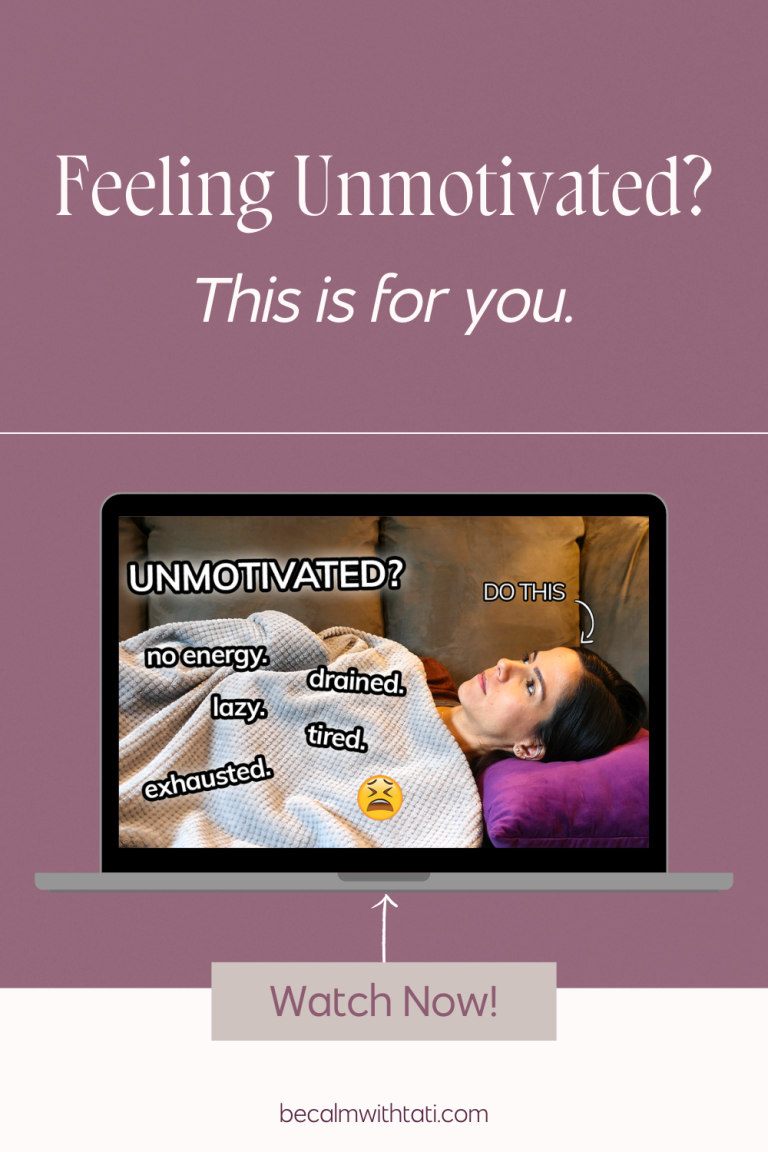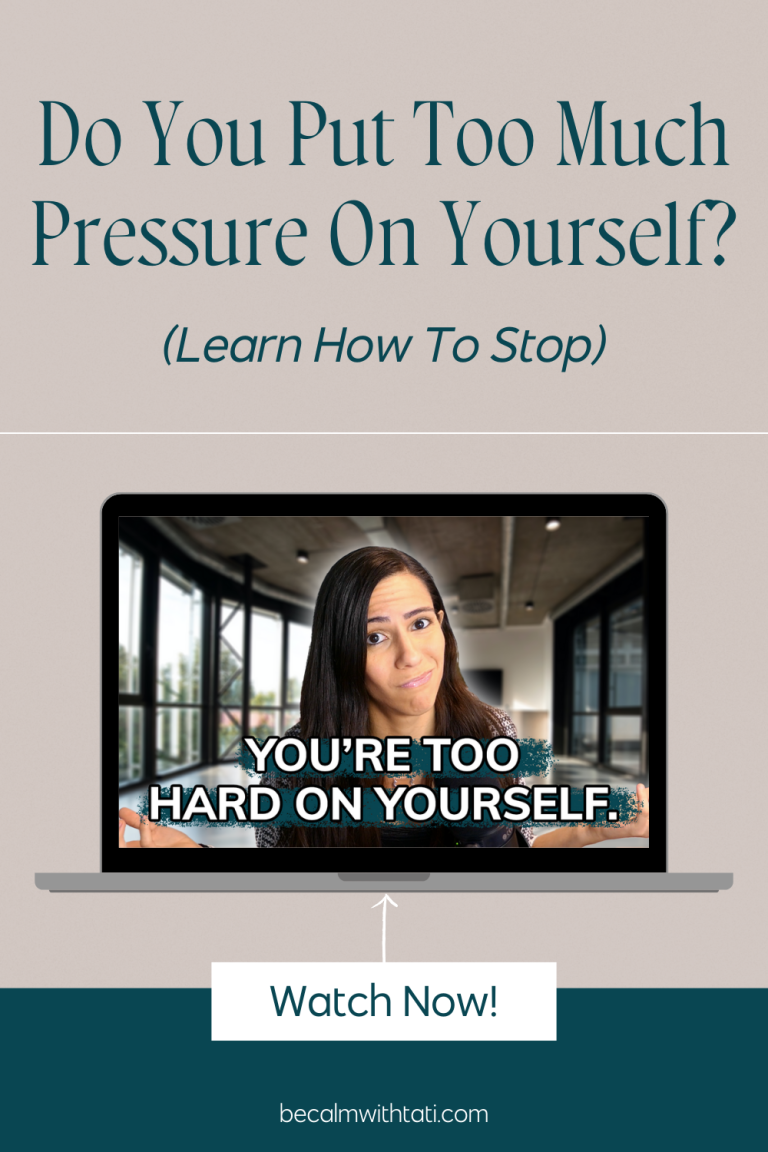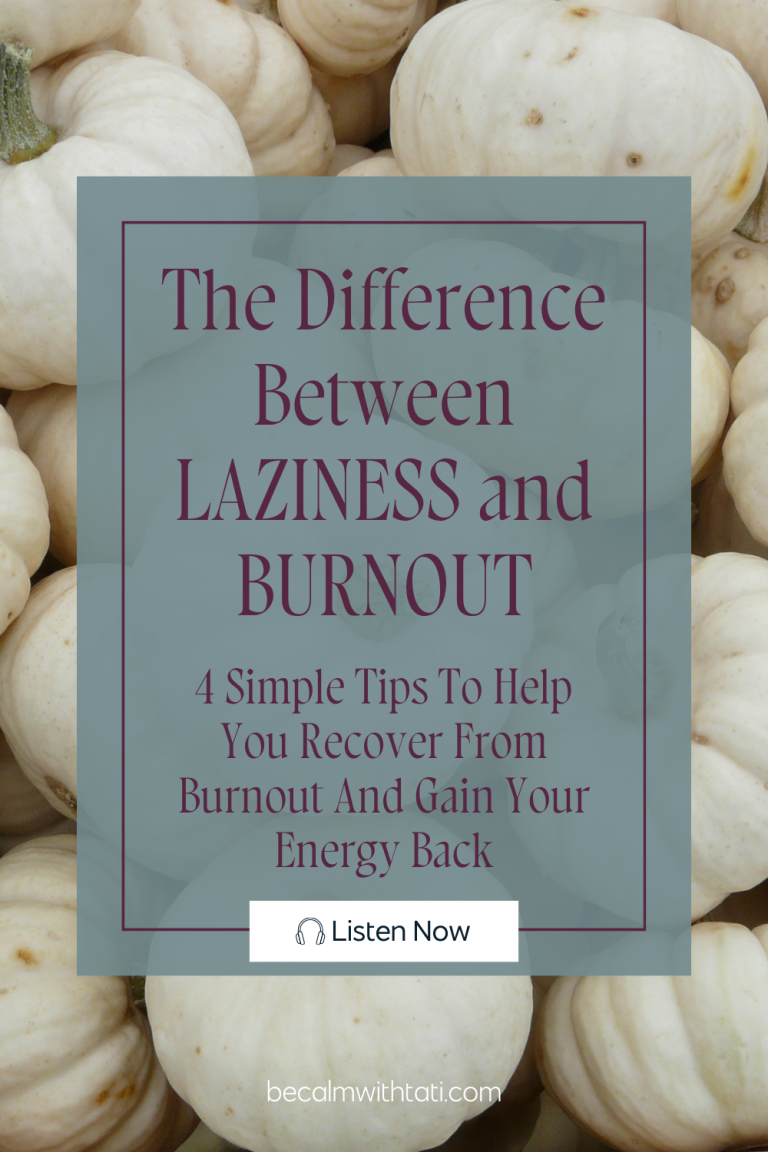We’ve all been there: you know you need to relax and take a step back from work, but it’s so hard to actually put into practice. Your mind won’t stop racing with the tasks on your never-ending to-do list when you try to relax, and you worry about dropping the ball before you’ve even had the chance to step away. It doesn’t have to be this way, and you DESERVE to take time for rest and relaxation. In this episode, we’ll explore why you struggle with relaxing and what you can do about it to finally achieve balance and fulfillment in your days.
In this episode, you will learn:
- Why you actually struggle with relaxing (it’s more than just a never-ending to-do list)
- Practical strategies and mindset shifts to relax without dropping the ball
- What to DO to actually help you relax
Mentioned in episode:
What To Do When You Feel Guilty Relaxing: Podcast & YouTube
How To Get Organized With High-Functioning Anxiety: Podcast & YouTube
LISTEN NOW:
🎧 CLICK HERE TO LISTEN TO CALMLY COPING WHEREVER YOU LISTEN TO PODCASTS
WATCH NOW:
SUBMIT A MESSAGE, QUESTION, COMMENT OR SUGGESTION TO THE PODCAST: Message
FREE TRAINING: How to Create Work-Life Balance and Feel Calmer From Within
If you want to learn how to take back control of your life so you can feel calmer and more confident, and learn the tools to spend your time according to what matters most to you (no matter what your schedule is like right now)…
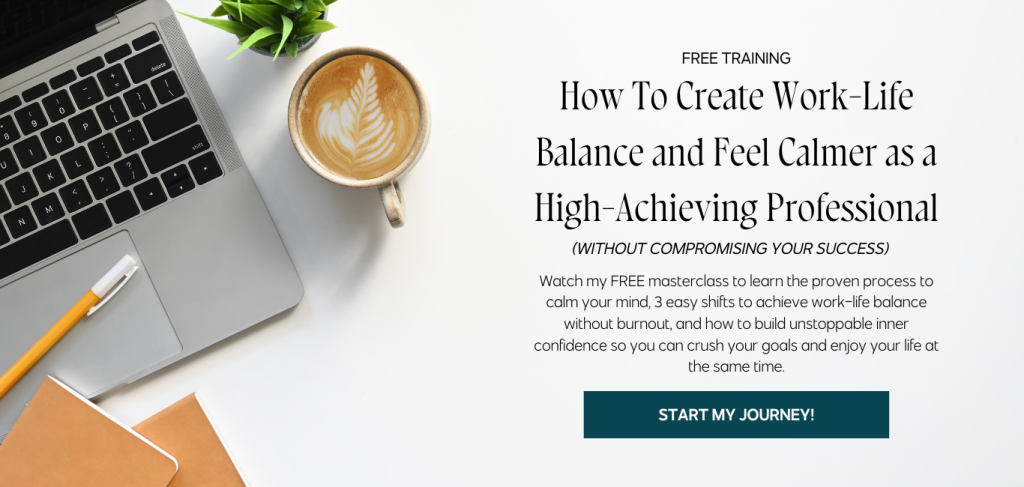
LISTEN, REVIEW, AND SUBSCRIBE TO THE PODCAST!
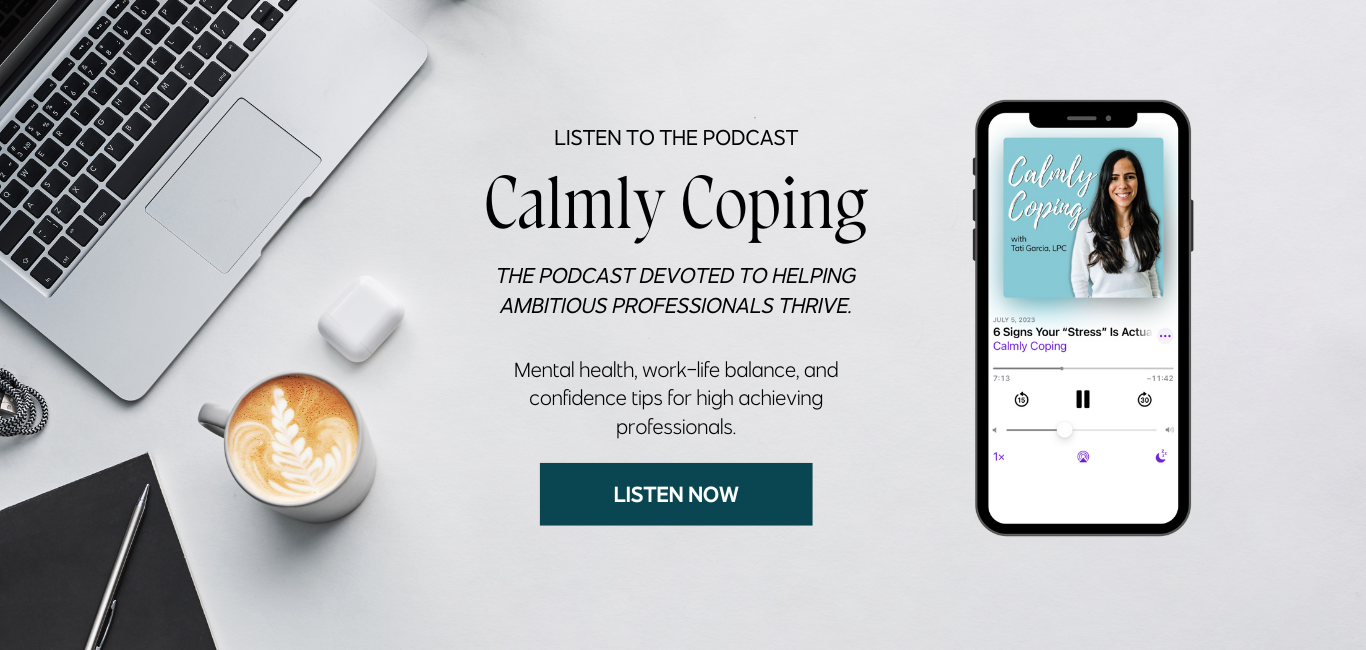
INTRO/OUTRO MUSIC: Rescue Me (Instrumental) by Aussens@iter (c) copyright 2018 Licensed under a Creative Commons Attribution (3.0) license. http://dig.ccmixter.org/files/tobias_weber/57990 Ft: Copperhead
DISCLAIMER: All content here is for informational purposes only. This content does not replace the professional judgment of your own mental health provider. Please consult a licensed mental health professional for all individual questions and issues.
Interested in diving deeper to get support for high-functioning anxiety?
I offer 1:1 coaching to help high-achievers overcoming high-functioning anxiety so they can feel calmer, more present, and have improved balance in their lives. Click here if you’re interested in learning more and getting started.
Calm, Balanced, & Confident is my comprehensive A→Z self-paced course to help high-achieving professionals overcome high-functioning anxiety so they can feel calmer, balanced, and more confident without the anxiety and overwhelm. Click here to learn more and enroll today.
Looking for ongoing support and guidance with high-functioning anxiety? The Calm & Ambitious Community is the exclusive community for high achievers with high-functioning anxiety. Click here to learn more and join us today!
TRANSCRIPT:
Click to view the episode transcript.
We’ve all been there. You know you need to relax and take a step back from work, but it’s so hard to actually put into practice. Your mind won’t stop racing with the tasks on your never ending to do list when you try to relax, and you worry about dropping the ball before you’ve even had the chance to step away.
It doesn’t have to be this way, and you deserve time for rest of relaxation. In this episode, we’ll explore why you struggle with relaxing, and what you can do about it to finally achieve balance and fulfillment in your days.
Welcome to Calmly Coping. My name is Tati Garcia and I’m a licensed therapist and coach specializing in high functioning anxiety. I help high achievers stop putting themselves last so they can feel more calm, balanced, and confident from within. If this topic interests you, then please like, subscribe, and hit the notification bell so you’ll be notified every time I release a new episode.
Thank you so much for tuning in. The weekend comes, it’s Saturday morning, and you have the fresh anticipation of a weekend ahead to spend how you would like. You feel excited and at peace. Then the anxious thoughts start bombarding you? What about cleaning the house? What if there’s a work crisis you’re not aware of?
You have so much to do next week. What if you just knock out a few things this morning in order to get ahead? What about buying a birthday gift for your niece’s upcoming birthday? Oh, you forgot about, and it continues. Relaxing seems like a distant memory. And let’s say it is time to relax. What do you do?
How do you actually relax? So many of us feel guilty taking the time to relax. because that is something that we have learned. It’s something that is socially acceptable because of our capitalist society where oftentimes our worth can be equated to how busy we are, how productive we are, how much we’re doing.
And the reality is though that there is a difference between being busy and being productive. However, we have oftentimes conflated the two to see that busyness means that you are a worthy person, you’re a productive person, you are successful, you must have things going well in your life, when in reality, that is not always the case.
And, It can seem like there’s a never ending to do list because there’s always more to do. There’s always more things that you can add to make yourself feel like you’re being productive and get that gratification of checking something off a list. However, you can also at the same time, if you’re constantly stuck in this cycle, be depriving yourself of your own needs to rest and recharge.
So there are the societal roots when it comes to the guilt or the difficulty with relaxing. There could be your personal expectations. Maybe you are somebody who has high standards for yourself and you want to be accomplishing big things. And there is nothing wrong with that. However, sometimes our expectations for ourselves can exceed the amount of time we have, the capacity that we have, because we all have limits as human beings.
And then there can be the psychological components that when you’re somebody who is struggling with anxiety. anxiety, it can feel like because of the worries going through your mind, sometimes it can feel like you have a difficulty relaxing. It can feel like it’s hard to slow down or shut down or turn off.
And there can be other, you know, outside of anxiety, but I’m not going to go into all of the details of all different mental health diagnoses, but there can be other factors coming into play there as well. And there can also be the impacts of workplace culture. So if you see those around you always working, or even in your family of origin, so.
Let’s say when you were growing up, if you saw your parents constantly busy and doing things and never taking time for themselves to relax, you could have internalized this image yourself, and it could be something that you carry on unconsciously without even realizing, why am I doing this, these things?
Why do I struggle to shut down and turn off when it’s something that has given been potentially ingrained in you from a young age. There can be fears underlying that if we’re talking about anxiety specifically. So maybe there’s a fear of letting others down. So you don’t want to say no to things, the fear of failure.
So you don’t want to drop the ball and just stop working or doing things that need to get done. Maybe the fear of being viewed as incompetent or lazy. There are so many benefits when it comes to relaxation and relaxation does not have to look like this. a specific way, and I’m going to talk more about that later in this episode.
However, it can positively benefit your mental health, your physical health, your overall productivity. You can experience an improved mood because you’re taking time to recharge and for it yourself. You can also have improved focus as a result of having this space and energy and time for yourself, and you can also have improved relationships.
because you are potentially taking time away from just getting things done and then putting them towards the things and people that matter to you in your life. And that can include your relationships. You could also experience improved creativity from taking time to relax because creativity requires space and time for your mind to wander and process and create internally.
So then this can be outwardly. created by you. And it can also help you to work through the problems that might be coming up in your life, make connections. If you’ve ever experienced maybe having an idea come to you when you are driving in the car somewhere in the shower, or even after a good night of sleep, this is when our unconscious mind is working through things.
And if we’re constantly Taking in information or constantly doing more and more, then our minds often don’t have time to make these connections and to think in these ways. So now here’s some specific strategies for how you can relax without dropping the ball. First is a mindset shift of just recognizing that.
Relaxing does not mean that you’re going to drop the ball, that you can take a step back, and that doesn’t mean that everything’s going to fall apart. Actually, the less that you take breaks, whether it’s time off or even, you know, a weekend or afternoon or day for yourself or whatever that looks like for you, the less you do that, the more you are reinforcing the idea that I can’t do that because through your behaviors, you’re communicating to your brain.
Well, if taking time off were so easy, then I would be doing it, but because I’m not doing it more, it’s hard. And it’s some, it means that there’s going to be some negative consequence that occurs. So it’s kind of this reinforced thing cycle that is continuing to happen. So part of it can be just leaning into the discomfort of, I know it’s hard to take time off because you’ve gotten yourself in this pattern because it feels like there’s so many bad things that can happen.
But once you prepare for it properly and take that step and take that. leap, then you are actually communicating to yourself that I can do this and it’s not a big deal and not everything’s going to fall apart because the reality is it’s not. People take time off all the time. People take time to relax all the time.
People aren’t always productive. People go without keeping their houses spotless or doing their laundry on a regular basis. And sometimes in order to take time to relax, if you’re the kind of person who’s constantly on top of things, sometimes that can mean. Letting things slide and being okay with that and it doesn’t mean that your life has to fall into disrepair. Oftentimes there can be this all or nothing thinking that it’s either I am on this rigid schedule doing all the things getting all the things done or or everything’s going to fall apart and I’m not going to be able to pick the pieces up and I’m never going to fall back into my routine.
And we’re ignoring that middle ground, that gray in between, which is often where most of our experience exists. That it’s not perfection, it’s not falling apart, but it’s allowing yourself to be human and recognizing that you need this time to recharge and the other ball’s not going to drop. you Everything’s not gonna go to crap.
Just experimenting with what does that gray area look like? Maybe there’s other people in your life that you can observe that have gotten a handle of that and they’re used to it. And sometimes that can look like letting go of control and recognizing that always being in control isn’t something that is allowing you to feel less stressed or less, less anxious.
It’s again, something that’s reinforcing. that stress and anxiety and that’s because you are so intolerant of uncertainty or of allowing things to be or of allowing yourself to just take a step back that you’re teaching yourself, well, I need to constantly be holding on tight and doing all the things on my list or else.
That’s one mindset shift overall. When it comes to specific strategies, this can look like scheduling your downtime in advance, but not being rigid with like, okay, from 4pm to 4. 30, I’m going to be walking my dog, then I’m going to be watching TV for 4. 30 to 5, then I’m going to, you know, like, we don’t need to get into the nitty gritty, but it’s just about in advance.
Putting this time, especially if you’re somebody who relies on your calendar, scheduling this time out for you, scheduling out lunch breaks, scheduling out your evening routine, and just making that time for yourself in advance so you can know what your boundaries are. So you can know at this time I’m shutting down from work.
At this time I’m letting go of the to-do list, and I’m just allowing myself to enjoy, be present to rest. This can also look like setting boundaries and that can look like learning how to say no. learning how to decide whether or not you want to do something. And oftentimes we can feel like, well, if I don’t have plans and then I don’t have an excuse to say no to this request, but I really wanted to take this time for myself.
But I really wanted to relax this day and taking time for yourself. is a reason to say no, we all need that downtime. And depending on what it is that you’re saying no to, if it’s something that isn’t important to you, that you really don’t want to do, but you’re doing it out of guilt or obligation, then it is okay to say no.
And you don’t need this perfect excuse or reason to explain away to people. And one thing that can help is being more efficient when it comes to your workspace. When you set boundaries, that can actually help you to be more efficient with your work time. And this can also look like not multitasking and doing one task at a time.
Because when we multitask, our attention is spread in a million different directions, and it’s hard to actually make progress on one thing. This can look like time blocking, setting aside your calendar to make time for that. I actually have a whole episode on how to get organized with high functioning anxiety, where I talk about these tactics.
So I will leave a link in the description if you’re watching on YouTube, it’ll be in one of the corners. So, now what do you actually do to relax? I’ve seen this many times in our Facebook community, Calmly Coping, which you can find the link for in the description if you’re interested in joining us.
People saying, well, okay, I don’t know what to do to relax. I don’t know how to wind down. Because you’ve gotten so used to doing things done and being busy that it can sometimes And even though it can seem like it’s obvious, well, you relax. If you haven’t been doing it, then it can be hard to know, how do I actually relax?
So you can think back to what you enjoyed doing as a child. So in your free time, for me, it was reading, learning, doing things like chemistry sets and magic shows and riding my bike and being active and getting outside, playing with friends outside. playing video games. So think back to for yourself, what was that?
And can you do any of these things? Can you bring any of these things into your life? You can also ask yourself, what do you value? What is it that you enjoy doing? What is important to you? So is this creativity? Is it nature? Is it socializing? Is it family time? You can use your values as a guide to how you spend your free time.
The things that are important to you can be a guide for what you’re doing. And you can also ask yourself, what helps you feel recharged? Is it a nap? Is it watching TV? Is it reading a book? Is it sitting on the balcony or in your yard outside and soaking in the sun? Is it walking to your favorite coffee shop?
calling a friend on the phone. It’s going to be different for everybody, and it doesn’t always have to be the same thing. This can be something that you check in with yourself and ask yourself, what do I need? What will help me feel recharged right now? And there’s no guilt associated with it. If it means time spent scrolling on your phone or time spent watching your favorite TV show, that’s perfectly okay.
For me, I will go to my comfort watches, especially if I’m in a period where I’m particularly stressed or I will return to watching the same shows over and over again because that is comforting and enjoyable for me. And it’s all about at the end of the day, setting boundaries, you know, as long as your entire life or the vast majority of your time isn’t scrolling through tick tock or binge watching shows and you have a balance and you’re creating time and space for yourself to allow your mind to wander, to be present, to enjoy time socializing with others, whatever that looks like for you, then it is.
okay, and there’s no guilt that you need to feel for doing these things that are seen as lazy or unproductive or whatever labels society has attached to them. And relaxing, even though we might think of relaxing as, um, resting on the couch, relaxation can also be active. So it can be restful. It can be kicking up your feet on the couch and, you know, having a bowl of popcorn and watching your favorite movie.
It can also be going for a walk, or you know, if you’re the kind of person who struggles with just being still, maybe that relaxation is more active for you. Maybe it is going for a hike or exploring your neighborhood or going to a local bookstore. That was something I did this weekend. That was super enjoyable.
So finding what it is for you and start small and simple. So it doesn’t have to be these grandiose things where you’re making this plan to do two this crazy, like 10 mile hike, and that’s going to be my relaxation, just start small and sprinkle this into pockets of time throughout your day. And remember that relaxation does not have to be productive.
And you should not even be thinking about productivity. Even if you’re doing something where you’re creating something, where there’s an outcome or an end goal, or where you are being active, and maybe you want to. You know, beat a certain record. I want to encourage you to stay away from that. Stay away from any sort of measures or thinking of outcomes and focus on just the process and the journey because that’s what relaxation is all about, regardless of whether it is active or restful or anywhere in between.
So ask yourself, How can you rest, recharge, and rejuvenate? I’d love to hear from you if you have any tips or suggestions or questions on how to relax without dropping the ball. You can send me a voice message by going to CalmlyCoping.com/message. And remember that relaxing is not dropping the ball.
It’s ensuring that you’re in best shape to keep the ball rolling smoothly. I have another episode on what to do when you feel guilty relaxing that I think you will find very helpful if you struggle with this. You can check out this episode here. And while you wait for next week’s episode, I also have other episodes about calming your mind, improving work life balance, and feeling more confident from within.
Thank you so much for tuning in today and until next time, be calm.
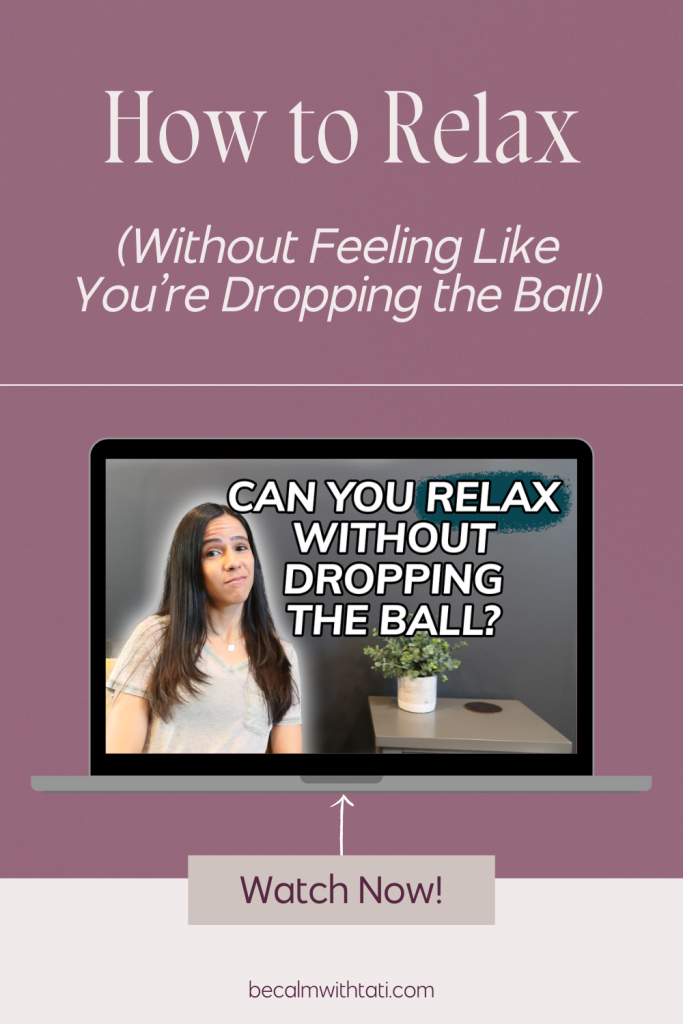
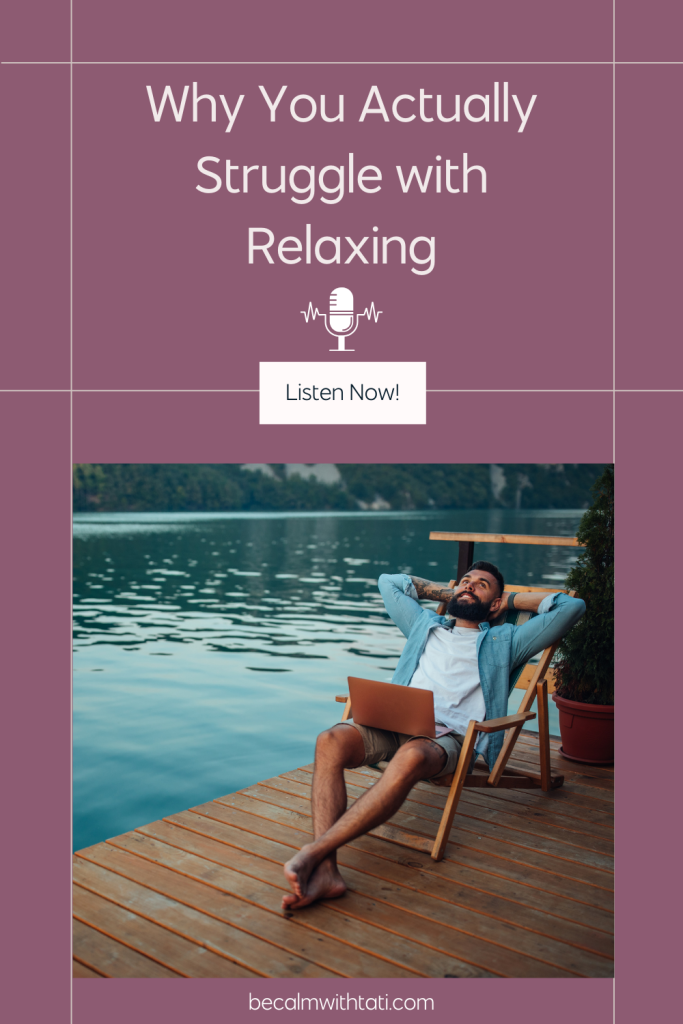
Until next time…




